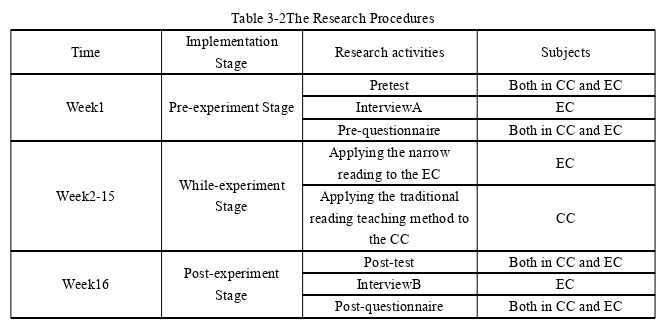联系方式
more本类最新英语论文
- 2024-01-04基于歧义容忍度差异的初中生..
- 2023-09-25象似性视角下左移位构式的认..
- 2023-08-18正念对学习投入和英语自主学..
- 2023-06-11基于语料库的话语标记语you..
- 2023-03-26初中英语交互式写作教学模式..
- 2023-01-08基于新课标的高中英语语法教..
- 2023-01-02情景教学法在初中英语语法教..
- 2022-10-12以思维可视化训练提高高中生..
- 2022-07-11高中英语教师听力课堂高阶思..
- 2022-06-24刘道义中小学英语教育思想对..
more热门文章
- 2017-12-12对英语口语课堂外教提问特征..
- 2012-04-13英语教学论文发表:teachin..
- 2017-11-23基于微课的英语翻转课堂实证..
- 2011-12-19英语教学论文发表-《淡谈如..
- 2018-01-01基于双重编码理论的英语图文..
- 2011-12-13英语教学论文发表-《简述意..
- 2012-05-31英语教学论文怎么写?英语教..
- 2011-11-14英语教学论文发表-《交际法..
- 2011-12-13英语教学论文发表网-《应用..
- 2012-03-29英语教学论文发表《英语报刊..
more留学论文写作指导
- 2024-03-31卡森•麦卡勒斯小说中..
- 2024-03-28美国黑人女性心理创伤思考—..
- 2024-03-27乔治·艾略特《织工马南》中..
- 2024-03-21超越凝视:论《看不见的人》..
- 2024-03-19《哈克贝利•费恩历险..
- 2024-03-13心灵救赎之旅——从凯利的三..
- 2024-02-22文学地理学视角下的《印度之..
- 2023-05-03英、汉名词短语之形容词修饰..
- 2023-02-07目的论视域下5g—the futur..
- 2022-07-04二语英语和三语日语学习者的..
窄式阅读在城乡结合部高中英语阅读教学中的推广思考 [3]
论文作者:留学生论文论文属性:硕士毕业论文 dissertation登出时间:2022-05-19编辑:vicky点击率:1742
论文字数:36566论文编号:org202205180944274261语种:英语 English地区:中国价格:$ 44
关键词:英语教学论文发表
摘要:本文是一篇英语教学论文发表,笔者经过16周的教学实践和对实验前后数据的分析,作者发现实验班学生的阅读状况有了显著的发展。阅读恐惧明显减少。此外,实验班学生已经建立了阅读信心,他们的阅读策略和阅读成绩也在提高。

Chapter 3 Research Methodology....................... 14
3.1 Research Questions...............................14
3.2 Research Participants.......................... 14
3.3 Research Methods.........................14
Chapter 4 Data Analysis and Discussion.............................. 25
4.1 Results and Discussion of the Interview in EC............................25
4.1.1 The Analysis and Discussion of the InterviewA Before the Experiment...........25
4.1.2 The Analysis and Discussion of the InterviewB After the Experiment............. 27
Chapter 5 Conclusions.........................41
5.1 Major Findings of Study............................. 41
5.2 Implications of Study.................................42
5.3 Limitations of Study...................................42
Chapter 4 Data Analysis and Discussion
4.1 Results and Discussion of the Interview in EC
This part is about the analysis and discussion of the interview results of students. Thepurpose of the interview is to answer the first research question. The author interviewed thestudents in the experimental class before and after the experiment.
4.1.1 The Analysis and Discussion of the Interview Before the Experiment
In order to have a deeper understanding of the situation of students' English reading, theauthor interviewed 9 students in different levels according to their scores after the pretest, andthen recorded them. The following are interviews with 3 students:
Q1:1. Do you like English reading lessons? Why?
High-score group: S1: I like English reading class very much, especially when theteacher shows us the reading background before explaining the reading material, I think it isvery interesting. And I can get a lot of knowledge from reading, so I feel very happy to knowthe colorful world.
Medium-score group: S1: I like reading class, but only in the lead-in part before reading.In this part, the knowledge introduced by the teacher is generally very interesting and easy tounderstand in combination with Chinese. However, in the latter part, the explanation ofreading materials makes me feel very boring. When it comes to grammar, I find it difficult tounderstand, so I sometimes lose concentration.
Low-score group: S1: I don't like English reading class, because I will encounter manyunfamiliar words and complex sentence structures. Most of the sentences analyzed by theteacher are difficult for me to understand, and it is difficult for me to complete the readingtasks assigned by the teacher in class, such as summarizing the main idea of the article or themain idea of each paragraph.
沪ICP备10026080号-1








